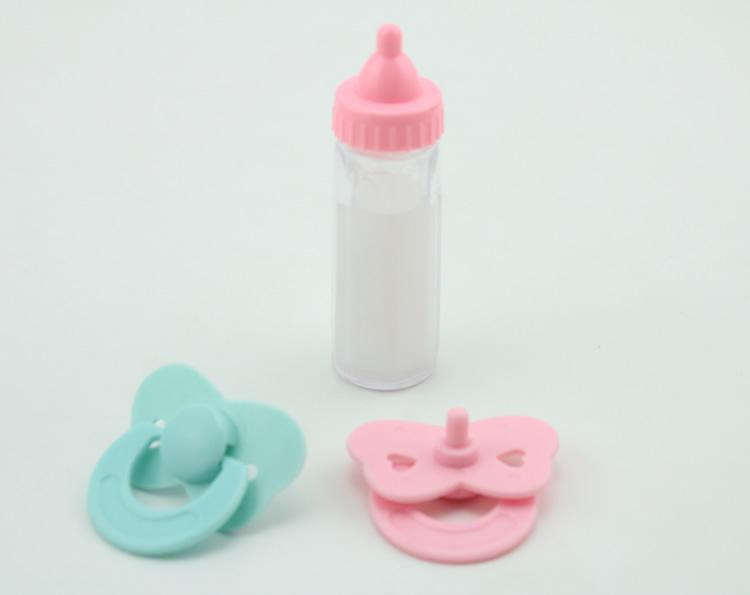The long-term use of a pacifier or baby bottle can lead to tooth decay and expensive orthodontic problems. Baby teeth, even though temporary, guide the proper eruption of permanent teeth, assist in the development of speech, and help maintain correct chewing habits. Alternative self-soothing options and dental checkups for your child are to avoid unnecessary pain and discomfort caused by a baby bottle or pacifier. While both items have benefits in child-rearing, it is important to know of the dental dangers they can possess.
Call Our Office at 715-646-2161 Today!
The doctors at River Birch Dental in Centuria, WI, believe that weaning your child from his or her bottle and pacifier at an early age can have a positive and lasting impact on their oral health and general wellbeing. Call us today to discuss your dental concerns at 715-646-2161 or contact us online anytime.
The Hidden Dental Dangers of Baby Bottles
Baby Bottle Tooth Decay
This hidden dental danger is responsible for tooth decay in many children. Cavities in baby teeth are caused by exposure to any drink other than water for an extended period. The risk for tooth decay increases when you put your child to bed with a bottle full of milk, formula, juice, or soda. The sugar and carbohydrates in the liquid are in constant contact with the teeth, creating an environment that decay-causing bacteria will thrive.
Tooth decay leads to painful infections, tooth extractions, and extensive dental treatments. White spots on the teeth and near the gum line is an indicator of early tooth decay. Later stage tooth decay symptoms include black or brown spots on the teeth, bleeding or swollen gums, fever, and bad breath.
Prevention is the best approach to avoiding baby bottle tooth decay. Here are some helpful ways to prevent this from happening to your child:
- Wean your child from using a baby bottle for all liquids by one year of age, or at the latest, eighteen months.
- Once weaned from the bottle, train your child that milk is for mealtimes only. Offer water to drink throughout the day.
- Limit all acidic foods and juices. If you give your child juice or a sugary drink, avoid putting it in a bottle. Only use bottles for milk, breast milk, and formula.
- Good oral hygiene habits develop at a young age. Brush twice a day and always before bedtime.
- Bottles should not take the place of a pacifier for comfort and soothing.
- Begin pediatric dental visits at an early age.
The transition from the bottle to a cup or a sippy cup can have its challenges. Here are some helpful tips to wean your child off the bottle:
- Introduce the sippy cup around six months of age.
- Replace one bottle feeding a day with the cup. Continue this for a few days before replacing another feeding.
- Avoid bottle weaning when the family is not under the stress of moving, having a new baby, going on vacation, or starting daycare.
- Praise, positive reinforcement, and encouragement can make all the difference in successful weaning.
- When your child is upset, comfort them in other ways – like singing, playing a special game, rocking, or using a security blanket.
- You know your child best – and going cold turkey may be the best scenario. Some parents have a brief send-off ceremony to say goodbye to the bottle while celebrating the child for being a big girl or big boy.
Call Our Office at 715-646-2161 Today!
The Hidden Dental Dangers of Pacifiers
Pacifier Teeth
The short-term use of a pacifier does have some benefits to it, like lowering the risk for SIDS in infants. Long-term use, however, can lead to several hidden dental dangers. Using a pacifier past age two, can encourage the teeth to grow in crooked or not align as they should, jaw misalignment, and can narrow the width of the roof of the mouth. This will lead to costly orthodontic problems that will need correcting as your child becomes a teenager.
It is crucial to wean your child by two years of age and schedule professional dental cleanings to prevent the risk of pacifier teeth. However, breaking your child’s pacifier habit can be daunting. Here are a few helpful tips to break the habit for good.
- When your child asks for a pacifier, distract them with a fun activity or game.
- Pacifiers offer comfort and security to your little one so finding another object your child can use can be helpful. Objects could be a special blanket, a doll, or another important toy.
- Some parents use a sticker chart for positive reinforcement to acknowledge every day the child goes without using their pacifier.
- Like bottle-weaning, save this transition for a time when the family isn’t moving, having a new baby, or going on vacation.
- Again, cold turkey may be the best option for your child with a brief farewell ceremony.
Contact Us
Healthy teeth for our youngest patients begin at home. Help your child develop habits and routines that encourage healthy eating and proper dental care. It can make a huge difference in your child’s health for many years. Schedule your child’s first dental cleaning at River Birch Dental around two years of age. Call us at 715-646-2161 or contact us online anytime.

